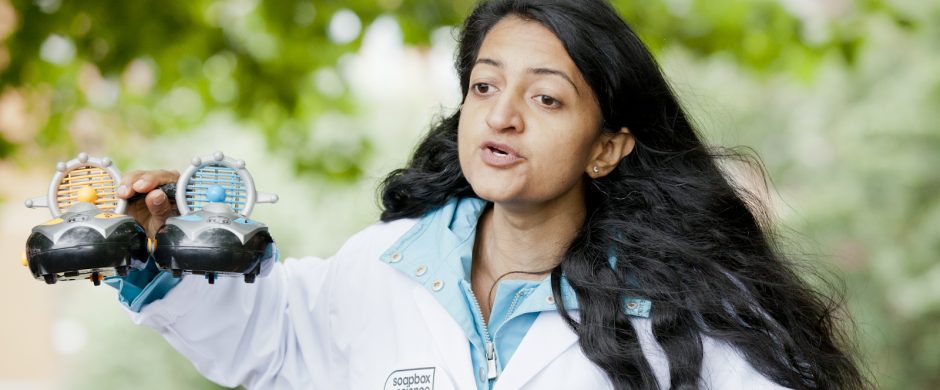
Fiona Malone (@miona_falone) is a biomedical engineer studying for her PhD as part of the GMedTech research group at Galway Mayo Institute of Technology. Fiona’s research focuses on the behaviour of cardiac source blood clots and their role in the occurrence of acute ischaemic stroke. She has won several awards for her communication and presentation skills over the course of her postgraduate studies and can’t wait to be a part of Soapbox Science Galway in July. Here, she tells us about her postgraduate journey thus far and how she’s sees the end (finally 😉) in sight
You can catch Fiona at Soapbox Science Galway on July 15th 2017. where she will be giving a talk called: “Biomedical Engineering: Build your own body parts.”
by Fiona Malone
As I approach the final stages of my PhD in Biomedical Engineering, I reflect on the lessons that I have learned throughout this incredibly interesting and rather intense journey.
Patience and Perseverance
I suppose it goes without saying that a PhD candidate should be of a patient nature when agreeing to climb this academic Everest. I knew this all too well, yet nothing could have prepared me for this expedition. You must be prepared for hours and hours of thinking, working, experimenting, writing, editing and rewriting again. You will be faced with many circumstances which will drain your time, energy and good self, but you must always try to persevere. You can be the most organised person in the room but nobody can predict when essential lab apparatus will go missing, or when a USB device will decide to pick that exact moment to fail on you. I know it can be easier said than done (especially if you are trying to make deadlines and project goals) but try not to sweat the small stuff – it will only discourage you.
On that note, you must also be prepared to fail. My first attempt at publishing a paper got annihilated by an editor, but I learned from it and persevered to improve my written communication skills which I have subsequently used in my thesis and other applications and publications. Always turn a failure into an opportunity to learn and never give up.
Communication
Always make time for opportunities to communicate your work, be it to colleagues, supervisors, potential bosses or even just your friends. One of my favourite quotes by Einstein is “If you can’t explain it simply, you don’t understand it well enough”, and this is especially true to scientific communication. The better you become at communicating your research to your audience, be it an editor of a journal, an interview board or even a group of kids, the more focused your research will become.
Please don’t be afraid to ask for help either. I was at a conference a few years ago and was explaining the difficulty I was having in carrying out a particular experiment. At my talk, I highlighted the discrepancies in the results due to this experimental method, which led me to some interesting collaborations with engineers and scientists who were in attendance at the conference. If I had not communicated effectively, I would never have made those connections and I would never have gained that scientific knowledge to improve my research.
Independence, Initiative and Innovation
You must remember that at PhD level you are creating new knowledge. You can be guided and supervised to an extent but it must be your own initiative and innovation that independently answers your research questions. Be confident in your abilities – you have acquired the knowledge and applied it thus far.
Don’t be afraid to think outside the box. Part of my research involved investigating the mechanical properties of blood clots and how they perform under different loading conditions. The literature available for such research methodology is quite limited, so I spent my days reading about plastics, rubbers and adhesives to gain insight into how they were tested.
Always try to work smarter rather than harder. You may need to refocus your research questions numerous times throughout the duration of your PhD as you discover new things and learn new concepts. That’s the beauty of the process! Ideas breed ideas and soon you will be able to collect them all to tell a story about your work that makes logical sense from beginning to end. So try not to waste your time on tasks that will not give you favourable results. Stay focused and work smartly towards your goals. It is also extremely advisable to know when to call it a day too!
I am really thrilled to be finishing my PhD. It has been a mammoth task, with ups, downs, and lots in between. It might not have always been fun but it has definitely been fulfilling and I’ve learned an awful lot. I am grateful for the opportunities it has continuously brought me to learn, create and innovate. PhDs are not meant to be easy, if they were, everyone would do one!
